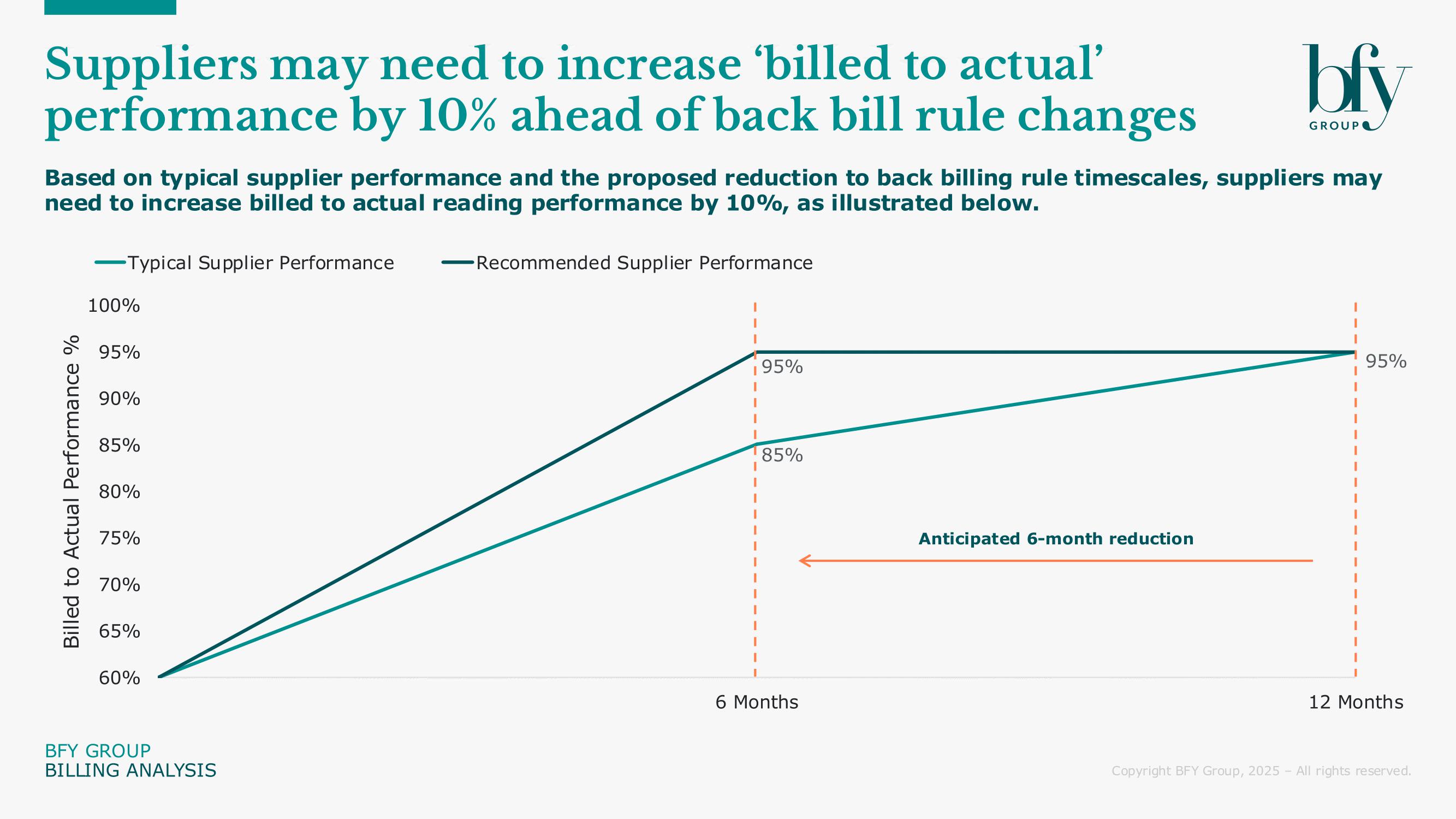The UK electricity market could be facing significant financial risks due to potential changes in back billing rules.
Ofgem’s ongoing consultation on improving debt standards in the domestic retail market could lead to a reduction in the back billing window from 12 months to 6 months, with a decision expected in March.
The proposed change continues the recent focus from Ofgem on improving customer experience. With this latest proposal, Ofgem aim to drive increased protection for customers by encouraging greater billing accuracy and reducing the potential burden of backdated costs, continuing the drive to deliver more positive customer outcomes across the industry.
BFY estimate this change, aimed at strengthening billing accuracy and improving metering and reading processes, could create a £200m-£300m additional cost to suppliers each year, based on current levels of accuracy.
How could suppliers be impacted?
- Increased Commercial Risk: If the back billing window is reduced without corresponding improvements in billing accuracy, suppliers will face a dramatic rise in the volume of undercharged energy they’ll need to absorb, further squeezing already tight margins.
- Operational Strain: Current billing processes, while adequate for a 12-month back billing period, may well be insufficient for the reduced timeline. As a result, suppliers risk increased financial write-offs and operational inefficiencies.
Below, we outline the root causes of inaccurate billing for energy suppliers, and how they can be addressed to reduce commercial risk and operational strain, ahead of Ofgem’s potential back bill changes. You can also complete our interactive Billing Capability Assessment at the end of this article, offering instant, tailored guidance to help you achieve industry-leading billing accuracy.

What are the root causes of inaccurate billing?
Inaccurate, late, or estimated meter readings
Despite widespread adoption of smart meters, around 40% of the UK population is still serviced through traditional or non-communicating smart meters. These customers need to either provide actual readings themselves, have their meter read by a pedestrian meter reader, or accept estimated billing.
This puts customers and suppliers at risk of over or undercharging consumption, which is one of the main causes of calls, complaints and hard to collect debt. It also poses significant challenges in preparation for Market Wide Half Hourly Settlement (MHHS), which we recently addressed here.
If the timeframe for back billing is drastically reduced, any natural correction that a supplier performs in the 6–12-month window could be at risk. This could lead to increased write offs or a need to increase the frequency of meter readings, escalating costs.
Faulty or malfunctioning meters
Approximately 1.6m non-communicating smart meters are projected to be in use across the UK by the time MHHS is introduced in 2027. These meters can contribute to inaccurate readings, delays in submission, and faulty bills, which will be harder to address in a 6-month back billing period.
Whilst there's already a lot of external pressure on suppliers to increase smart penetration, further efforts will be needed to correct non-comms issues. Response times and success rates will need to increase, or substitute channels such as customer-provided readings or pedestrian meter reads put in place until resolved.
Our latest smart blog shared further opportunities to address non-communicating meters here.
Pricing and tariff errors
Incorrect billing, such as applying the wrong tariff or rate to a customer, can lead to undercharges. If the regulations change, any discrepancies may no longer be recoverable after 6 months.
Extra controls may be needed in this area to ensure there is no avoidable financial impact.
Late billing and system errors
Billing delays or errors stemming from operational errors — such as incorrect data entry, system exceptions, or communication issues between suppliers — can often result in inaccurate bills. If the back billing window is shorter, these errors will need to be caught and corrected faster, putting more pressure on existing control frameworks and operational resources.
Portfolio accuracy issues may also be a problem. Challenges with knowing who is at the property and whether it is vacant or not can also drive inaccurate billing, as can issues with account or meter set up.
How can suppliers improve billing accuracy and mitigate risk?
To address these challenges, suppliers must prioritise improvements in billing accuracy capabilities to proactively identify and respond to customer issues.
Key strategies include:
Maximise the number of bills that are right first time
Implement proactive monitoring and faster identification of billing errors. Currently, many suppliers detect issues too late, reacting to customer dissatisfaction or accuracy alerts that are aligned to a 12 month back bill rule.
If the timeline is reduced this could lead to costly back-billing. Suppliers should aim for 95%+ of bills being right first time.
Improve meter read channel success
Suppliers should focus on increasing the rate of actual meter reads and reducing reliance on estimates, operating a range of channels for obtaining meter readings. This includes:
- Intelligent smart deployment that targets the right customers
- Effective customer read strategies that incentivise and adapt to customer behaviours to increase success rates
- Pedestrian meter reads that provide back stop assurance when everything else fails.
Achieving the right channel mix and success rate requires investments in technology, processes, and customer insights to ensure that meter readings are received when needed.
Improve 3rd party relationships and outcomes
Strengthen relationships with the 3rd parties in your supply chain, particularly those involved in meter installations, flow management, and data collection.
Incentivise success with risk reward relationships that drive the outcomes you need to prevent billing accuracy issues. The focus should be on achieving right first-time billing through reducing inaccurate data and processing error.
For guidance which is tailored to your current performance levels and ways of working, complete our interactive Billing Capability Assessment at the bottom of this article. Answering our questions will generate practical improvement opportunities based on your response, which can be implemented to drive industry-leading billing accuracy.
How can we help?
BFY offers comprehensive solutions to help suppliers enhance their billing capabilities and mitigate the risks posed by the potential rule changes. Our services include:
- Billing Capability Assessments: We evaluate your current processes, performance, controls, and performance oversights to identify key areas for improvement against industry best practice. Take our interactive Billing Capability Assessment below, or share it with your billing department lead. Alternatively, get in touch to hear more about how our full, comprehensive billing maturity assessment can diagnose tactical opportunities and strategic gaps.
- Proactive Error Identification and Resolution: We help implement and design bespoke control frameworks to identify and resolve billing issues before they become a significant impact to your organisation. Early intervention of issues prevents significant customer impacts and avoids costly rebills. Ultimately you will reduce contact, back bill write off and increase collectability.
- Meter Reading Optimisation: We devise bespoke, multi-channel solutions that are tailored to your specific customer base and system requirements. This ensures you minimise meter reading costs while increasing your success rate and billing accuracy performance.
For more on these solutions and how they can be applied in your organisation, contact Jon Vincent.
Complete our interactive Billing Capability Assessment
To receive tailored guidance based on your current performance levels and ways of working, complete our interactive Billing Capability Assessment below. As you answer the questions, you'll receive tailored recommendations and practical improvement opportunities to enhance your billing accuracy and achieve industry-leading results.
Q1: In your organisation, how effectively are billing issues identified and resolved to prevent back billing write-offs?
Q2: How strong is your smart metering performance in improving billing accuracy?
Q3: How effectively does your meter read strategy drive actual readings and accurate billing?
Q4: Are tariffs and rates applied accurately to customer bills?
Jon Vincent
Client Director
Jon helps clients resolve problems with billing, settlements, and customer service.
View Profile

